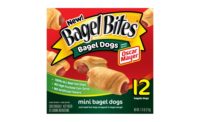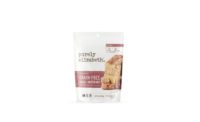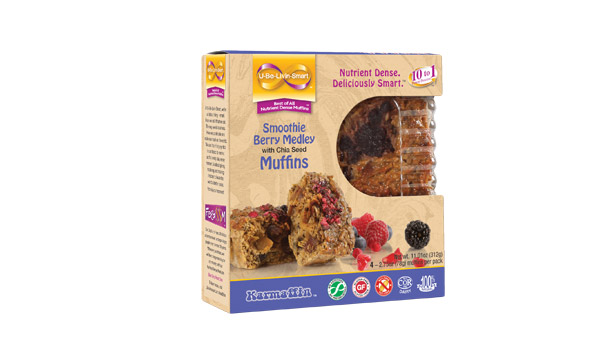Muffin and bagel trends






New formulations and attributes, such as portability and convenience, make consumers take a second look at these longtime favorites.
With so many new and improved baked goods on the market—many being developed in response to recent consumer trends—it’s a wonder that people are still buying muffins and bagels. They are, but not as much as they used to.
In addition to facing competition from other categories, muffins and bagels—especially today’s jumbo versions—have lost health-conscious customers over the past few years, due to reputations for being high in calories, fat, sugar and more.
Still, muffins and bagels have many of the same attributes that consumers like about their competitors: They’re easy to make; they’re portable; and they can be eaten anytime. For some bakers, the key to continued success with these products is healthier versions of them.
Mighty muffins
U-Be-Livin-Smart Inc.’s Karmaffins live up the tagline on their redesigned package: “Nutrient Dense. Deliciously Smart.” The all-natural muffins contain no additives, preservatives or added flour, sugar, oil or salt. They’re also gluten-, tree-nut- and peanut-free. Each muffin has 9 g. of protein, 4 g. of fiber and a full serving of fruits and vegetables. Available flavors are Smoothie Berry Medley with Chia Seed; Belgian Chocolate with Banana; Orange Cinnamon with Mango; and Apple Cinnamon with Chia Seeds.
“A year ago, when we started rolling out our Karmaffins, we thought [gluten-free] was cresting—that it was a high as it could possibly get in terms of a trend,” says Tim Sinclair, co-owner of the Concord, Ontario-based company. “It continues to be as high as it was last year, so consumers are still thinking about gluten-free.
“What we’ve learned from our customers, though, is that they’re now starting to go into the second phase of gluten-free, which is that it’s one thing to be gluten-free, but is it healthy? The definition of gluten-free is that [a product] doesn’t have wheat, barley, rye or oats. Just because it doesn’t have those items in it doesn’t necessarily mean it’s healthy. What we’re seeing is that consumers are becoming much more appreciative of products like ours.”
Sinclair believes the bar for gluten-free products is raising, now that consumers are reading the labels on these products to see what other ingredients they contain.
Another trend likely to impact the industry over the next year or two will be genetically modified organisms (GMOs), says Sinclair. “There’s a lot of energy on GMOs right now,” he notes. “A year ago, people started getting educated about GMOs.” He adds that U-Be-Livin-Smart understands the sensitivity to GMOs, and “plans to talk about GMOs in its products in the next six months.”
Roger R. Piffer, e-commerce marketing director, J.S.B Industries, Chelsea, Mass., maker of Muffin Town gluten-free muffins, Smart Choice Muffin Tops and other baked goods, also says consumers are looking for healthier ingredients.
“We, too, have whole-grain products under our Smart Choice label, and we are also striving to meet the ‘nut-free call’ we are hearing everywhere,” he says. “We are also working on a variety of healthy baked, snack-type items that will be introduced later this year.”
Consumers are also eating smaller portions, Piffer adds, which dovetails well with J.S.B Industries’ product lines. “Smaller and portability are key for us,” he explains. “So many of our customers are eating their meals while at work or in motion in some way.”
And, like Sinclair, Piffer sees “specialty groups resurfacing, and gluten-free becoming a much larger segment.”
Muffin malaise
Despite manufacturers’ efforts to introduce muffins that meet consumer trends, the muffin category is struggling. “I think that deep down, people realize that muffins are just cake in disguise,” says Sinclair. As a result, more people are looking for healthier, more nutritious alternatives.
“The breakfast and dessert categories are both facing challenges, as we deal with obesity and just find balance in our diets,” says Piffer. “It’s difficult for us to convince Main Street that they can have a muffin or cornbread now and then, but the real challenge is [getting] people [to] understand portion size and variety in the diet, and moving around more.”
Still, Piffer believes there are opportunities in the category with savory and fiber- and protein-enriched items. “We will survive and evolve with the trends, and find new ways to increase the health benefit of our items,” he adds.
Down, but not out
Like their “cake-like” counterparts, English muffin manufacturers are also offering products that address consumer trends, such as convenience, portability, healthier ingredients and dietary restrictions, to retain and grow their market share.
“Convenience is a huge factor in breakfast decision-making,” says Laura Kuykendall, director of marketing for Boulder, Colo.-based Glutino, a Boulder Brands company, that offers a variety of gluten-free foods, including English muffins and bagels. “For most consumers, gone are the days when they sit down for a hot, home-cooked breakfast before beginning the work or school day. [They] opt instead for things like Glutino Toaster Pastries and English Muffins, which they can eat quickly or take on-the-go. While our traditional breakfast items sales remain strong, we see growing sales in convenient, portable offerings.”
Recognizing that consumers want products that are better-for-you as well as convenient, Glutino recently launched its Multigrain English Muffins, made with flax seed meal, sunflower seeds and flax seed. “[The] product line is currently the fastest-growing in its category,” says Kuykendall. The versatile, trans-fat-free product has 200 calories and 3 g. of fiber per serving and can be used for recipes ranging from breakfast sandwiches to individual pizzas.
“As demand for gluten-free products has risen, retailers have begun to give gluten-free foods more prominent space in their stores,” says Kuykendall, when asked about opportunities for the category.”
Bagels branch out
Bagels, which have been denounced by nutritionists in recent years for having too many calories and carbohydrates, are still a popular breakfast item for some people because they’re available in lots of varieties, quick to make and portable for on-the-go lifestyles. And bagels are now are venturing into other mealtimes, as consumers find creative uses for leftover bagels, such as bread crumbs, chips, croutons and even French toast.
They also make great sandwiches, points out Dave Harris, president of Original Bagel Co., West Caldwell, N.J., which offers 27 varieties, including a new cheddar cheese bagel with an eye-catching appearance, and custom formulas. “Any way we can show our customers that bagels are better for a sandwich than a roll or a wrap, we’re going to do it,” he explains.
Since starting nearly 20 years ago, Original Bagel has seen many challenges in the bagel industry, Harris says. “Ironically, every time a trend comes along and harms bagel sales, we see a nice jump right as the trend begins to cool down,” he notes. “While diets like Atkins and gluten-free are here to stay, bagels have remained an important part of many peoples’ diet. Nutrition is all about balance, and bagels (or other grain-based foods) can play an important part role.”
Harris says that while industrywide bagel sales are steady, Original Bagel’s customers are reporting sales increases between 3-10%, some even more. “Every day, we focus on producing authentic, water-boiled bagels, so our customers have a group of ‘loyal bagel customers’—the people who tell their friends and neighbors that their store has the best bagel in town,” he explains. “Original Bagel is small, and we want to keep it that way. Our goal is to achieve modest sales growth year after year, so we can focus on helping our existing customers grow and strengthen their bagel sales in a very competitive retail environment.”
While many muffin, English muffin and bagel producers may not agree with Harris’ desire to keep a company small, they probably would agree with his goal of achieving even modest sales growth year after year, given the competition facing these categories.
Looking for a reprint of this article?
From high-res PDFs to custom plaques, order your copy today!





-Philly-Tax-Free-vs.-Taxed-Bagel.png?height=200&t=1681239871&width=200)



